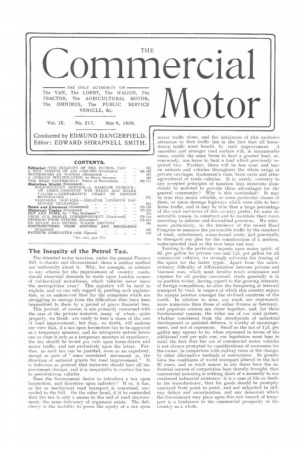The Inequity of the Petrol Tax.
Page 1

If you've noticed an error in this article please click here to report it so we can fix it.
The intended motor taxation, under the present Finance Bill, is chaotic and ill-considered: there is neither method nor uniformity about it. Why, for example, in relation to any scheme for the improvement of country roads, should abnormal demands be made upon London owners of rubber-tired motorbuses, which vehicles never leave the metropolitan area This injustice will be hard to explain, and we can only regard it, pending such Explanation, as an undeserved blow for the companies which are struggling to emerge from the difficulties that have been bequeathed to them by a period of grave financial loss.
This journal, of course, is not primarily concerned with the case of the private motorist, many of whom—quite properly, we think—are ready to hear a share of the cost of road improvement; but they, no doubt, will endorse our view that, if a tax upon locomotion has to he approved as a temporary measure, and its retrograde nature forces one to class it only as a temporary measure of expediency, the tax should be levied pro rata upon horse-drawn and motor traffic, and not exclusively upon the latter. Further, no such tax can be justified, even as an expedient, except as part of " some correlated movement in the direction of national grants for road improvement." It is ludicrous to pretend that motorists should bear all improvement charges, and it is inequitable to confine the tax to petrol-driven vehicles.
Does the Government desire to introduce a tax upon locomotion, and therefore upon industry ? If so, it has, so far as mechanical road transport is concerned, succeeded to the, full. On the other hand, if it be contended that the tax is only a means to the end of road improvement, the same deficiency of argument exists. The deficiency is the inability to prove the equity of a tax upon
motor traffic alone, and the unfairness of this exclusive attention to that traffie lies in the fact that all horsedrawn traffic must benefit by road improvement. A smoother and stronger road surface will, in innumerable cases, enable the same horse to haul a greater load, or, conversely, one horse to haul a load which previously required two. Further, there will be less wear and tear on animals and vehicles throughout the whole range of private carriages, tradesmen's vans, farm carts and other agricultural or trade vehicles. It is, surely, contrary to any accepted principles of taxation that motorists alone should be mulcted to provide these advantages for the general community Why is this overlooked ':' It may be true that motor vehicles, or some particular classes of them, at times damage highways which were able to bear horse traffic, and it may be true that a large percentage of the road surveyors of this country prefer; for some inscrutable reason, to construct and to maintain their roads according to inferior and discredited practices. We refer, more particularly, to the tendency of the recent Road Congress to measure the permissible traffic by the standard of weak, unbottomed, water-bound roads, and practically to disregard any plea for the consideration of a modern,. water-proofed road as the true basis and test.
Turning to the particular imposts upon motor spirit, of 3d. per gallon for private cars and 1,Ad. per gallon for all commercial vehicles, we strongly advocate the freeing of the spirit for the latter types. Apart from the extraordinary difficulty of differentiation between private and business uses, which must involve much annoyance and expense for all parties concerned, trade generally is in no position to-day, having regard to the growing intensity of foreign competition, to allow the hampering of internal, transport by road, in respect of which this country enjoys. the unique position amongst the civilised countries of the world. In relation to area, our roads are enormously more numerous than those of either France or Germany, and populous centres are closer together, and, for those fundamental reasons, the wider use of our road system, whether considered from the standpoints of industrial development or national defence, is worthy of encouragement., and not of repression. Small as the tax of 1?,d. per gallon may appear to be, when expressed in terms of the additional cost per mile run, our legislators must bear in 'mind the fact that the use of commercial motor vehicles is not always prompted by considerations of economies forthe owner, in comparison with railway rates or the charges by other alternative methods of conveyance. So greatly have the conditions of world transport altered in the last 20 -s-ears, and so much nearer to our doors have the inanstrial centres of competition been thereby brought, that commercial motoring is nothing short of a necessity to ourcontinued industrial existence : it is a case of life or death to the manufacturer, that his goods should be promptlyconveyed from point to point, and not subjected to rail-way delays and uncertainties, and any deterrent which the Government may place upon this new branch of transport is a hindrance to the commercial prosperity of thecountry as a whole.






















